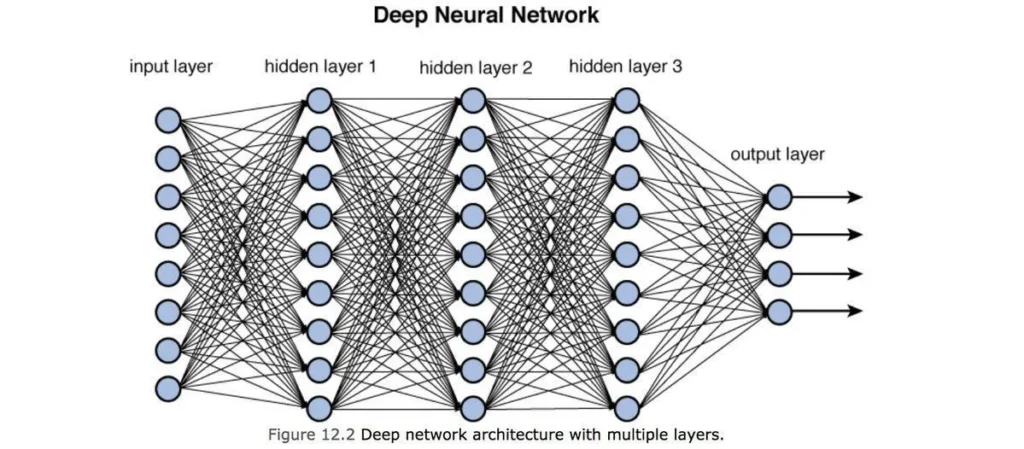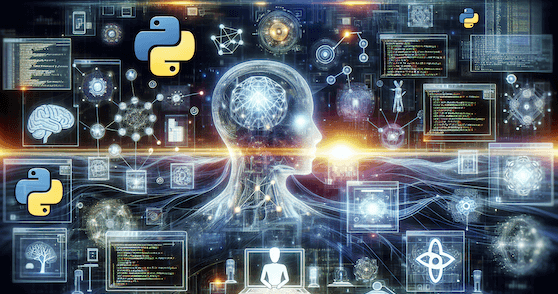News Artificial intelligence AI and Python skills 2024 deep learning AI #
Try free AI Job Posting - Enter in the Field Below
As we navigate through the technological transformation that characterizes our era, the significance of Python programming skills cannot be overstated for anyone looking to lead in the fast-evolving landscape of deep learning AI. With the annual economic impact of generative AI poised to reach between $2.6 trillion and $4.4 trillion by 2024, grasping the enormity of this shift becomes crucial.
Python, with its 22.5% year-over-year adoption increase, has cemented its role as a cornerstone in the realms of artificial intelligence, data science, machine learning, and beyond, highlighting the burgeoning demand for professionals adept in these competencies.
This article aims to delve deep into the symbiotic relationship between AI and Python, outlining not just the evolutionary journey of artificial intelligence but also why Python emerges as the definitive language for AI development. From discussing the core AI skills one should aim to master by 2024, including chatgpt, convolutional neural networks, and tensorflow, to exploring Python’s pivotal role in educating the next generation of AI experts, we will navigate through the trends shaping AI and Python learning.
Additionally, insights into the resources for advanced learning, career opportunities, and challenges, as well as success stories in the domain, will be provided, offering a comprehensive view of what lies ahead in the dynamic field of deep learning AI.
The Evolution of Artificial Intelligence
Artificial Intelligence (AI) has evolved dramatically from its conceptual beginnings in the early 20th century, where it was primarily featured in science fiction as fantastical automatons, to a fundamental technology in various industries today. This evolution can be viewed as a series of key developments and milestones that have significantly shaped its current state.
Early Concepts and Theoretical Foundations
The journey of AI began with its portrayal in media and literature, where it captured the public’s imagination through characters like the Tin Man in “The Wizard of Oz” and the robotic Maria in “Metropolis.” However, the theoretical groundwork began in earnest with the introduction of the term “robot” in a Czech play in 1921, signaling the start of serious thought about automating human tasks using machines.
Initial Developments and Applications
By the mid-20th century, AI moved from theory to application. The first industrial robot, Unimate, was employed by General Motors in 1961, revolutionizing assembly lines. During this period, the Turing Test, proposed by Alan Turing in 1950, provided a framework to evaluate a machine’s ability to exhibit intelligent behavior equivalent to, or indistinguishable from, that of a human.
The Rise of Machine Learning and Formal Logic
AI’s potential was further realized through early programs like the Logic Theorist, which successfully proved theorems in symbolic logic. This era also saw AI’s prowess in games, with programs developed to play checkers and chess, setting the stage for future interactions between AI and strategic game planning.

Challenges and Setbacks
Despite these successes, AI experienced periods of reduced interest and funding, known as “AI winters,” the first of which occurred between 1974 and 1980. These were mainly due to inflated expectations and the subsequent realization that AI could not yet fulfill all its promised capabilities.
Resurgence and Modern Advances
The field regained momentum in the 1980s and 1990s with significant enhancements in algorithms and an increase in computational power. This period marked the popularization of “deep learning” techniques by pioneers like John Hopfield and David Rumelhart. The modern era has seen landmark achievements such as IBM’s Deep Blue defeating the world chess champion Gary Kasparov in 1997 and the widespread implementation of speech recognition technologies.
Current Trends and Future Directions
Today, AI is ubiquitous, with applications ranging from predictive analytics in business to advanced diagnostics in healthcare. The ongoing goal is to achieve general intelligence, where machines will potentially surpass human cognitive abilities across all tasks. This pursuit continues to drive innovation and research in the field, promising even more sophisticated AI applications in the future.
The evolution of AI has been a path marked by incredible advancements and occasional setbacks. However, each phase has contributed to a deeper understanding and more robust development of intelligent systems, which continue to transform every aspect of human life.
Why Python Dominates AI Development
Python’s dominance in AI development is largely attributed to its versatility and comprehensive suite of libraries tailored for artificial intelligence and machine learning. Here are some of the key reasons why Python stands out as the preferred programming language for AI developers:
Comprehensive Library Ecosystem
Python’s rich library ecosystem is a cornerstone of its dominance in AI development. Libraries such as TensorFlow, Keras, and PyTorch provide robust platforms for building and training complex neural networks. Additionally, libraries like Scikit-learn for machine learning, Pandas for data manipulation, and Matplotlib for data visualization, make Python an indispensable tool for AI professionals.
Simplicity and Readability
One of Python’s greatest strengths is its simplicity and readability. This makes it accessible not only to seasoned programmers but also to those new to coding. The clear syntax allows for easy writing and understanding of code, which is essential when developing complex AI algorithms and handling large datasets.
Flexibility Across Operating Systems
Python’s ability to run on various operating systems such as Windows, MacOS, Linux, and Unix adds to its flexibility. This platform independence ensures that Python-based AI applications can be developed and deployed across different environments seamlessly.
Strong Community Support
The Python community is vast and actively engaged, offering an abundance of open-source resources, tutorials, and forums. This community support is invaluable for both beginners and advanced users, providing a platform for collaboration and continuous learning.
Speed and Efficiency
Python’s design allows for quick experimentation and iteration, which is crucial in AI development where rapid prototyping is often needed. Its concise coding requirements save time and effort, enabling developers to focus more on problem-solving rather than syntax errors.
Integration Capabilities
Python’s compatibility with various APIs and external platforms enhances its capability to integrate with other software and services. This integration is vital for AI applications that often require combining different tools and technologies.
Educational Support
Python’s role in education cannot be overstated. Its ease of use makes it an excellent tool for teaching complex subjects like AI and machine learning. Many academic institutions and online courses prefer Python for instructing students, further solidifying its position in AI education.
Industry Adoption
Major tech companies like Google, Facebook, and Amazon use Python for their AI and machine learning projects. This widespread industry adoption not only validates Python’s capabilities but also encourages more developers to learn and use Python for AI development.
Python continues to lead as the language of choice for AI due to its unmatched combination of flexibility, simplicity, and powerful library support. As we move towards more advanced AI applications, Python’s role is expected to grow even further, making it essential for developers to master this language.

Core AI Skills to Master by 2024
As we look ahead to 2024, the landscape of artificial intelligence (AI) continues to evolve, demanding a new set of core skills from those aspiring to excel in this dynamic field. Here’s a focused look at the essential skills that will be critical for AI professionals and enthusiasts in the coming years.
Understanding Algorithms and Neural Networks
Neural networks form the backbone of deep learning technologies, which are at the heart of the current advancements in AI. Mastery of various algorithms and understanding how they can be applied to neural networks will be crucial. This includes not only familiarizing oneself with the theory behind these technologies but also gaining practical experience in implementing them.
Proficiency in Programming Languages
To build and manipulate AI models effectively, proficiency in programming languages such as Python, Java, and R is essential. Python remains the leader due to its extensive libraries and frameworks that are specifically designed for AI and machine learning, such as TensorFlow and PyTorch.
Data Skills: Collection, Processing, and Analysis
AI systems are only as good as the data they process. Skills in data collection, cleaning, and analysis are indispensable. This involves not only handling large volumes of data but also understanding how to extract meaningful insights from this data, which can guide AI decision-making processes.
Ethical AI Development
As AI systems become more integral to our lives, understanding the ethical implications of AI technologies is paramount. This includes grappling with issues of data privacy, bias in AI algorithms, and the broader impacts of AI technology on society. Navigating these ethical dilemmas responsibly is a must-have skill for any AI practitioner.
Interdisciplinary Collaboration
AI applications are sprawling across various sectors including healthcare, finance, and urban planning. Professionals with the ability to collaborate across different disciplines, understanding the specific needs and constraints of various fields, will be particularly valuable.
Continuous Learning and Adaptability
The field of AI is one of rapid change and innovation. Staying informed about the latest technologies, breakthroughs in AI research, and emerging trends such as the impact of quantum computing on AI is essential. A commitment to continuous learning and the adaptability to shift with new advancements will define the successful AI professionals of the future.
Communication and Teamwork
The ability to communicate complex AI concepts in a clear and effective manner to non-experts is increasingly important. This goes hand in hand with strong teamwork skills and empathy, as AI projects often require collaborative efforts among diverse groups of people.
Creative Problem Solving
Finally, the ability to apply AI creatively to solve real-world problems will distinguish outstanding AI professionals. This involves thinking outside the box to devise innovative AI solutions that are not only technically feasible but also economically viable and socially beneficial.
Mastering these skills will not only prepare individuals for the challenges of tomorrow’s AI landscape but also position them to lead the development of AI technologies that are ethical, impactful, and transformative.

The Role of Python in AI Education
Python’s role in AI education is pivotal as it serves as the gateway for both beginners and seasoned professionals to enter the realm of artificial intelligence. The simplicity and flexibility of Python make it an ideal first language for individuals venturing into the complex world of AI. Here, we explore various resources and strategies for learning Python that are crucial for mastering AI skills by 2024.
Python Learning Resources
-
- Coursera’s “Python Data Structures” by University of Michigan
-
- This course provides a solid foundation in data structures, which is crucial for understanding how data can be stored and accessed in AI applications.
-
- Coursera’s “Python Data Structures” by University of Michigan
-
- “Real Python” Website
-
- Offers a wealth of tutorials and articles that cater to both beginners and advanced programmers. It’s a great resource for practical Python coding practices.
-
- “Real Python” Website
-
- “Automate the Boring Stuff with Python” by Al Sweigart
-
- Focuses on practical Python programming skills that can automate mundane tasks, a useful skill for any budding AI professional.
-
- “Automate the Boring Stuff with Python” by Al Sweigart
-
- “Python Crash Course” by Eric Matthes
-
- This book offers a comprehensive introduction to Python, covering various aspects of the language that are essential for AI development.
-
- “Python Crash Course” by Eric Matthes
Critical Skills in Generative AI
-
- The Generative AI Fundamentals in Python skill path at Dataquest is specifically designed to cover critical skills needed in AI. This path helps learners understand the core concepts of generative AI, providing hands-on experience with Python.
Essential Concepts and Libraries
-
- Understanding Python programming basics is essential for anyone working with AI. This includes familiarity with Python syntax, data types, and basic operations.
-
- Prioritizing relevant concepts such as machine learning libraries including TensorFlow and PyTorch is crucial. These libraries offer tools and functions specifically designed for developing and training AI models.
Choosing the Right Learning Platform
-
- Selecting the right platform is critical for effective learning. Platforms like Coursera, Dataquest, and others offer structured courses with hands-on projects that help solidify Python and AI concepts.
-
- Engaging with the Python community through forums, local meetups, or conferences can provide additional learning opportunities and networking prospects.
By leveraging these resources and focusing on the development of essential skills, individuals can effectively prepare themselves for advanced studies in AI and ensure they are on the cutting edge of this rapidly evolving field.
Trends Shaping AI and Python Learning
The landscape of AI and Python learning is being shaped by several significant trends that are revolutionizing how we interact with technology and prepare for future advancements. These trends not only influence the tools and techniques we use but also redefine the skills necessary in the burgeoning field of artificial intelligence.
Multimodal and Agentic AI
The integration of text, images, and sound in AI, known as multimodal AI, is enhancing human-machine interactions, making them more intuitive and efficient. Concurrently, the development of agentic AI is pushing the boundaries of autonomy within AI systems, enabling them to act independently and achieve set goals without human intervention. These advancements are pivotal in creating more sophisticated and self-reliant AI applications.
Open Source AI and Retrieval-Augmented Generation
Open Source AI continues to democratize access to advanced AI models and tools, fostering an environment of collaboration and innovation across the globe. This trend is complemented by retrieval-augmented generation, which enhances AI-generated content by integrating text generation with sophisticated information retrieval techniques. This not only improves the quality of AI outputs but also expands their applicability in various domains.
Customized Enterprise Models and Shadow AI
Customized enterprise models are being tailored to meet specific business needs, offering scalable solutions that enhance operational efficiency across diverse sectors. Meanwhile, Shadow AI, which refers to the independent use of AI tools by employees, presents both challenges and opportunities for organizational governance and innovation.
Generative AI and Its Economic Impact
Generative AI is making significant strides, projected to impact the economy by billions annually. This trend is not only automating routine tasks but also enabling large-scale data analytics, transforming job markets, and necessitating new roles such as AI Ethicists and Synthetic Data Scientists. The demand for professionals skilled in generative AI is surging, as evidenced by a dramatic increase in job postings and higher salary offerings compared to traditional roles.
AI Regulation and Hardware Acceleration
As AI technologies become more embedded in our daily lives, the need for robust AI regulation grows. Global initiatives are setting new standards for AI governance, ensuring that advancements in the field are balanced with ethical considerations and public safety. Parallel to regulatory developments, hardware acceleration technologies like NVIDIA’s CUDA are enhancing the capabilities of machine learning models, optimizing them for better performance and efficiency.
Machine Learning Operations and Advanced AI Tools
The rise of Machine Learning Operations (ML Ops) is simplifying the monitoring, management, and lifecycle of machine learning models, significantly reducing operational costs. Additionally, tools such as AI Gateway and Workers AI are streamlining the integration of AI functionalities into applications, making it easier for developers to deploy AI solutions across various platforms.
These trends highlight the dynamic nature of AI and Python learning, emphasizing the importance of staying updated with the latest developments. As these technologies continue to evolve, they offer exciting opportunities and challenges, shaping the future of how we learn, work, and interact with AI.
Resources for Advanced AI and Python Learning
Exploring advanced resources in AI and Python learning is crucial for anyone aiming to deepen their expertise in these fields. Here, I’ll outline some of the top courses, platforms, and tools that can significantly enhance your learning experience and skill set.

Online Courses
-
- Coursera’s “Advanced Machine Learning Specialization” by National Research University Higher School of Economics: This series of courses is designed to dive deep into various machine learning techniques, including deep learning, reinforcement learning, and natural language processing.
-
- Udacity’s “AI Programming with Python” Nanodegree: This program focuses on building foundational programming skills and understanding core principles of AI. By the end, you’ll be able to build neural networks from scratch.
-
- Google’s “Machine Learning Crash Course”: This is a fast-paced, practical introduction to machine learning with video lectures, real-world case studies, and hands-on practice exercises.
-
- Stanford University’s “CS224N: Natural Language Processing with Deep Learning”: Offered by one of the leading universities in AI, this course provides an in-depth understanding of how to build algorithms that process, analyze, and understand human language.
AI and Machine Learning Platforms
-
- Kaggle: Not only does it offer interactive courses, but you also get to practice on real-world datasets and participate in competitions to test your skills.
-
- TensorFlow and PyTorch: These platforms provide extensive documentation, tutorials, and code examples that are crucial for learning cutting-edge AI concepts.
-
- fast.ai: This is particularly known for its practical approach and focus on getting students to build models quickly.
-
- Udacity: Known for its comprehensive range of both free and paid courses, Udacity offers various programs that cater to different levels of expertise.
-
- YouTube: A vast resource where AI enthusiasts can find tutorials from experts and educators around the world.
AI Learning Resources
-
- Understanding AI Course: A foundational course for beginners.
-
- What is AI? Guide: This guide offers a quick overview of AI concepts and terminologies.
-
- AI Fundamentals Skill Track: A learning path designed to cover the essential skills in AI.
AI Tools and Packages
-
- Python Tools: Libraries like pandas, NumPy, Scikit-Learn, PyTorch, Keras, TensorFlow, and Hugging Face are indispensable for AI development.
-
- R Tools: Includes packages such as pandas, numb, mlr, keras, tensorflow, and Caret which are useful for statistical analysis and machine learning.
-
- Commercially Available APIs: Tools like OpenAI API, Cohere API, and Anthropic API offer advanced AI capabilities that can be integrated into various applications.
These resources provide a robust framework for anyone eager to advance their knowledge and skills in AI and Python. Whether you’re a beginner looking to get started or a seasoned professional aiming to stay at the cutting edge, these courses, platforms, and tools will equip you with the necessary expertise to excel in the dynamic field of artificial intelligence.
Careers in AI: Opportunities and Challenges
Exploring the dynamic field of artificial intelligence (AI) reveals a spectrum of career opportunities and challenges that are shaping the future of work. As AI technologies evolve, they create new job roles while transforming existing ones, requiring a blend of technical skills and adaptability from professionals.
AI Job Market Overview
AI continues to be a major driver of job creation, automating routine tasks and enabling human workers to focus on higher-level functions. Here’s a glance at some promising AI career paths and their average annual salaries:
-
- AI Engineer: $113,000 – Develops AI applications to enhance organizational efficiency.
-
- Machine Learning Engineer: $123,000 – Focuses on building and maintaining AI systems that learn and adapt from data.
-
- Data Scientist: $127,000 – Analyzes data to help organizations make informed decisions.
-
- Data Engineer: $104,000 – Manages data infrastructure to support data scientists and analysts.
-
- Software Engineer: $119,000 – Designs and maintains software, a foundational skill in AI development.
-
- Robotics Engineer: $99,000 – Works on the design and production of robots that perform various tasks.

The Impact of AI on Employment
AI’s influence on the job market is profound, affecting both the nature of jobs and the skills required:
-
- Job Creation: AI is not just about replacing jobs but creating new ones. For instance, the rise of AI-driven tools in healthcare has led to an increased demand for AI specialists who can develop and maintain these technologies.
-
- Skill Transformation: As AI automates basic tasks, the focus shifts to skills like critical thinking and problem-solving. Professionals are required to adapt by upskilling or reskilling to remain relevant in their fields.
Preparing for a Career in AI
To thrive in this evolving landscape, aspiring AI professionals should consider the following steps:
-
- Educational Qualifications: Most AI positions require at least a bachelor’s degree in related fields such as computer science, data science, or engineering.
-
- Practical Experience: Hands-on experience through internships or projects is invaluable. Engaging in real-world applications of AI can provide a competitive edge.
-
- Continuous Learning: The field of AI is rapidly changing. Professionals need to commit to lifelong learning to keep up with new technologies and methodologies.
Navigating Challenges in AI Careers
While the opportunities in AI are vast, there are significant challenges as well:
-
- Ethical Considerations: With great power comes great responsibility. AI professionals must navigate the ethical implications of AI technologies, such as privacy concerns and bias in AI algorithms.
-
- Job Displacement: As AI technologies advance, some roles may become obsolete, leading to job displacement. Workers need to be proactive in learning new skills to transition into emerging roles.
-
- Income Polarization: There is a risk that AI could widen income gaps. Those who can effectively integrate AI into their skillset may see their value and income increase, while others may find themselves left behind.
Case Studies: AI Success Stories
In the realm of artificial intelligence and Python development, numerous innovative case studies have emerged, showcasing the transformative power of these technologies across various industries. Here, we delve into some notable AI success stories that highlight the practical applications and impact of AI-driven solutions.
Detection of Aggressive Behaviour of Cattle Operators
Utilizing AI, a system was developed to monitor and analyze the behavior of cattle operators, enhancing safety and operational efficiency in livestock management.
Investment Data Management
AI tools have been employed to revolutionize investment data management, enabling more accurate predictions and smarter decision-making processes for financial institutions.
Digital Transformation of Food Supply Chain Management System
AI has played a pivotal role in transforming the food supply chain, making it more efficient and transparent, thus reducing waste and improving food safety.
Targeted Advertising System and API
An AI-driven targeted advertising system was created, leveraging data analytics to deliver more personalized advertising, significantly increasing engagement rates.
NLP to Enhance Text Analysis for Remote Education Platform
Natural Language Processing (NLP) technologies were applied to enhance text analysis capabilities of a remote education platform, improving the learning experience by providing tailored educational content.
Influencer Marketing Software from Scratch
A new influencer marketing software was developed using AI to analyze and predict influencer performance, optimizing marketing strategies for brands.
ML and NLP Models for Marketing & Advertising
Machine learning and NLP models were integrated into marketing and advertising sectors to refine strategies and enhance customer engagement through data-driven insights.
GPT-4 Prompt Engineering for Intelligent Systems
The latest in generative AI, GPT-4, was used to engineer prompts that aid in creating more intelligent and responsive systems across various applications.
Video Analytics and AI for Efficient and Error-Free Dumbbell Workouts
AI-driven video analytics were utilized to create a system that guides users through dumbbell workouts, ensuring proper form and minimizing the risk of injury.
Movie Recommendation Engine for Smart TV App
An advanced AI-powered movie recommendation engine was developed for a smart TV app, enhancing user experience by suggesting movies aligned with viewer preferences.
OCR Insurance Claims Processing Software
Optical Character Recognition (OCR) technology was used to streamline insurance claims processing, making the system faster and more accurate.
AI Freight Rate Prediction Solution for a Transportation Company
AI was leveraged to predict freight rates for a transportation company, enabling more effective pricing strategies and operational planning.
Marketing Campaign Performance Optimization
AI technologies were applied to optimize marketing campaign performance through real-time data analysis and actionable insights.

Trademark Similarity Search for Product Recognition Engine
An AI-based trademark similarity search tool was developed to enhance a product recognition engine, protecting brands and consumers from counterfeit products.
Implementing AI in the IoT-based Healthcare Application for Logistics
AI was integrated into an IoT-based healthcare logistics application, improving the management and distribution of medical supplies.
Single-Instance SaaS Ecosystem for Customer 360
A single-instance SaaS ecosystem was created using AI to provide a comprehensive 360-degree view of the customer, enhancing customer service and business decision-making.
Scaling Up a Fitness App with Deep Neural Networks
Deep neural networks were employed to scale up a fitness app, providing personalized workout and nutrition plans based on user data.
Applying Deep Learning for Face Anti-Spoofing
Deep learning techniques were utilized to develop a face anti-spoofing application, enhancing security measures for biometric systems.
Full-Cycle Web Application Development for a Retail Company
AI was integral in the full-cycle development of a web application for a retail company, optimizing both the user experience and backend operations.
Business Intelligence Solution for Retail Platform
A business intelligence solution was implemented for a retail platform using AI, providing deep insights into customer behavior and sales trends.
AI Gender Detection Solution
An AI-based gender detection solution was developed, used in various applications from marketing to security enhancements.
Smart AI-Generated Recipes
AI was used to generate smart, customized cooking recipes, enhancing culinary experiences for users worldwide.
NLP Customer Analytics Solution for Audio and Email Analysis
An NLP-driven customer analytics solution was implemented to analyze audio and email communications, enhancing customer service and support.
OCR Solution to Ease Invoice Processing
An OCR solution was developed to simplify invoice processing, reducing manual errors and improving business efficiency.
Social Media API Integration for Influencer Auditing and Rating
AI-powered tools were integrated with social media APIs to automate influencer auditing and rating, streamlining influencer marketing strategies.
OCR Solution and API for Secure Infrared Brand Verification
An OCR-based solution was created for secure infrared brand verification, enhancing anti-counterfeiting measures for products.
Predicting Success of Racehorses by 3D Depth Images
AI was used to predict the success of racehorses using 3D depth images, providing valuable insights for training and racing strategies.
Building Predictive Analytics Module for E-Commerce Platform
A predictive analytics module was developed for an e-commerce platform using AI, enhancing customer engagement and sales.
Consulting on Invoice Data Capture Software and ML Implementation
Expert consulting was provided for the development of invoice data capture software, incorporating machine learning to improve accuracy and efficiency.
Image Analysis to Enhance Ticket Processing Software
AI-driven image analysis was employed to enhance ticket processing software, improving the speed and accuracy of ticket handling.
Data Lake Implementation for Efficient Big Data Processing and Visualization
A data lake was implemented to facilitate efficient big data processing and visualization, leveraging AI for enhanced data insights.
Making a Project Management System Smarter
AI technologies were integrated into a project management system, making it smarter and more responsive to user needs.
Instagram Analytics in Hong Kong
AI was used to conduct detailed Instagram analytics in Hong Kong, providing insights into user behavior and trends.
Top Brands on London Instagram
An analysis of top brands on London Instagram was performed using AI, helping companies understand their social media impact.
Neural Network Implementation for Better Cycle Predictions
Neural networks were applied to improve cycle predictions in various applications, from manufacturing to logistics.
Building Social Media Analytics Software
A comprehensive social media analytics software was built using AI, enabling businesses to track and analyze social media engagement effectively.
Tableau Performance Optimization
AI was employed to optimize the performance of Tableau, a leading data visualization tool, enhancing its speed and efficiency.
Helping a Leading Game Developer Automate Customer Feedback Analysis
AI tools were used to automate the analysis of customer feedback for a leading game developer, improving product development and customer satisfaction.
Activity Recognition Model Using Accelerometer Signal
An activity recognition model was developed using accelerometer signals, enhancing motion detection capabilities in various devices.
Building Influencer Marketing Analytics Platform
An influencer marketing analytics platform was created using AI, providing detailed insights into influencer performance and audience engagement.
Churn Prediction Model for Online Sports Betting Company
A churn prediction model was developed for an online sports betting company, aiding in customer retention strategies.
Building Predictive Models to Improve Debt Collection Process
Predictive models were built to improve the debt collection process, increasing efficiency and success rates in financial operations.
Conclusion and Future Outlook
Throughout this exploration, we have navigated the ever-evolving landscape of artificial intelligence (AI) and Python, highlighting their pivotal roles in shaping the future of technology and innovation. The synergistic relationship between AI and Python underscores a transformative era where mastery of Python’s programming capabilities becomes vital for advancing AI’s powerful and dynamic applications. Through examining the historical milestones, current trends, and promising career opportunities within AI, alongside Python’s dominance in development and education, we underscore the criticality of upskilling in these domains to stay at the forefront of technological advancement.
The journey through AI’s development, its impact across industries, and the foundational role of Python in nurturing AI skills culminates in a call to action for continuous learning and adaptation. As we stand on the brink of AI’s potential to redefine every facet of human endeavor, the imperative for professionals and enthusiasts alike is to engage deeply with these technologies. Embracing the challenges and opportunities presented by AI and Python not only prepares us for the future but also enables us to contribute to a technologically enriched and ethically conscious global society.
FAQs
1. What does the AI development plan for 2024 entail?
The AI roadmap for 2024 is structured around three primary initiatives: “Responsibly Leverage AI to Advance Homeland Security Missions,” “Promote Nationwide AI Safety and Security,” and “Continue to Lead in AI through Strong, Cohesive Partnerships.” The Department of Homeland Security aims to harness the capabilities of artificial intelligence effectively while ensuring safety and ethical standards.
2. Is it beneficial to learn AI in 2024?
Absolutely, pursuing education in AI development and Machine Learning in 2024 is highly recommended. As technology evolves, AI and Machine Learning are becoming integral in various sectors, thus escalating the demand for skilled professionals in these fields.
3. What steps should I take to become an AI expert in 2024?
To become proficient in AI by 2024, you should focus on acquiring a solid background in computer science, understanding machine learning algorithms, developing expertise in programming languages such as Python, and gaining practical experience in data management and analysis. Continuous training, practice, and dedication are essential to excel in AI engineering.
4. Is ChatGPT based on deep learning technology?
Yes, ChatGPT operates on a deep learning framework known as the transformer model. This model is a type of neural network architecture specifically designed for tasks in natural language processing, including language generation and comprehension.


